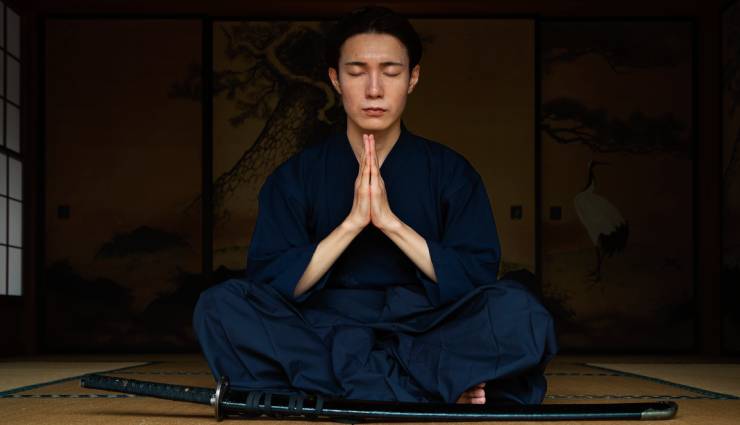We all have experienced moments of boredom and laziness. At these times, it seems we have no motivation in life, and our goals become unattainable dreams, but what is the solution? Perhaps the best way to deal with laziness is to pay attention to the Japanese lifestyle. Japanese people are famous in the world for their active lifestyle. Various factors such as sports and culture have made the people of this country more successful compared to other people in the world. Next, we explain 11 Japanese methods to deal with laziness.
1. Ikigai and the search for life
Finding Ikigai means identifying your purpose in life. ” There is no word like Ikigai anywhere in the world,” says Hector Garcia, one of the authors of the book “Ikigai: The Japanese Secret to a Long and Happy Life .”
The book of Garcia and Francis Mirales, which explains the secret of a happy and active life with a healthy body and mind, has been translated into 63 living languages of the world, including Farsi. To write this book, the authors went to the residents of Ogimi village in Okinawa province of Japan and interviewed more than 100 older adults living there. One of the distinctive features of these old villagers was that they each had an ikigai for themselves. When asked what their Ikiga is, they each name a specific occupation or art, such as gardening. They all know the source of their passion to continue living, and they engage with it daily.
Results of polls about Ikigai
Being busy or having energizing hobbies is a characteristic of many Japanese seniors. According to a survey conducted in Japan in 2018, 47.5% of 70-year-olds spend their lives working, doing hobbies, or participating in social activities. Also, according to another study conducted on Japanese people older than 65, the productivity of those who work only for financial reasons is reduced by 1.55 times that of those who pursue Ikigai.
So if you ask a Japanese person the secret to combating laziness, they will probably tell you first to find your Ikiga. This will help you wake up every day for a specific reason. Explore your strengths and interests and find a way to meet the needs of the world around you. When you align your actions and behavior with Ikigai, life takes on a deeper meaning, and motivation becomes a natural driving force.
2. kaizen; The connection between small steps and significant improvements
Japanese Kaizen means people should devote at least 1 minute to a specific daily activity. Masaki Imai, a Japanese theorist and author of the book “Kaizen,” coined this term. According to Imai:
The main message of Kaizen is that no day should pass without improvement of any kind. You cannot do kaizen 1 or 2 times and expect immediate results. You have to do this for a long time.
Kaizen is a simple technique that takes only 1 minute of your time daily. For example, if you want to read a specific book or play a musical instrument, you should devote 1 minute to reading that book or practicing music daily at a particular time. It doesn’t matter how lazy you feel to finish something; you should still get up and do it for a while, however short.
Kaizen teaches us not to be afraid of the greatness of our goals and to progress with small and continuous steps. Every small step counts and leads to significant gains over time. So laziness is not allowed.
3. Pomodoro technique to increase concentration and productivity
Are you one of those people who are easily distracted or prone to burnout? In that case, the Pomodoro technique may change everything. According to this technique, you must work for 25 minutes with total concentration to do anything and then give yourself a 5-minute break. Repeat this cycle until the desired work is done with more focus and energy.
The critical point in the Pomodoro technique is that your entertainment during the break should completely contrast the main work. For example, if you work with a computer, you should avoid the desk during your holiday and do sports or physical activity.
With the help of this technique, you can adjust the time of work and rest in the best way. In addition, your concentration will increase to do necessary tasks, and you will get used to a specific routine. What better way to deal with laziness than creating a daily routine?
4. Hara Hachi Bo; Conscious eating
Hara Hachi Bo is a Japanese term that means to eat until you are 80% full. This food habit comes from the city of Okinawa, Japan. The people of this city use this old advice to control their eating habits. Interestingly, the people of this city suffer from heart disease, cancer, and stroke less than the people of other Japanese cities and have the highest life expectancy.
Conserving energy is also an effective way to overcome laziness. The principle of Hara Hachi Bo encourages you to stop eating until you are full. Therefore, by avoiding overeating, you will not feel lethargic after eating and will have more energy to do your work.
5. Shoshin and welcoming the way of thinking of beginners
Shoshin means “beginner’s mind” and expresses one of our behavioral contradictions: the more we know about a subject, the less likely we are to learn new issues in that field. According to this principle, there are many possibilities in the minds of beginners, but the minds of experts consider fewer possibilities for each problem.
Laziness is often caused by fear of failure or perfectionism. Shoshin, or the beginner’s mindset, encourages you to approach things with curiosity and an open mind. So you don’t have to worry about knowing all the answers or being flawless from the start, but you have to learn how to learn, forget, and try new things. With the help of Shoshin, you discover your capabilities to overcome the obstacles of laziness.
6. Wabi Sabi; Finding beauty in imperfections

Let go of the need for perfection and embrace the concept of Wabi Sabi. Instead of stressing over the details, focus on what’s important. Embrace simplicity, appreciate imperfections, and stop striving for perfection.
Based on the philosophy of wabi-sabi, one of the essential Japanese principles for life, by enjoying your imperfections, you free yourself from the limitations of perfectionism and move towards your goals.
7. Forest bath and re-energizing from nature
The history of this technique goes back to Japan in the 1980s. Nature can considerably rejuvenate our minds and body. Walking in nature has been scientifically proven to reduce stress and improve mood. Spending time in nature is a crucial way to overcome laziness. It takes you away from your busy daily life.
So, to avoid getting lazy, you should get to the nearest park, breathe fresh air and let nature lift your mood again. You step towards the goal with renewed energy and a new feeling.
8. Kake Ibo; Saving the Japanese way
Financial stress can demotivate you and hinder your progress. With the Kake Ibo method, you manage your finances. According to this principle, you set and commit to a budget plan. By organizing your finances, your stress will be reduced, and you will have no excuse for laziness.
9. Kanban method and work management in the best way
Kanban is a method invented by the Japanese in the 1940s in Tokyo. Based on this method, you should make a board for them to manage things better. Breaking down big tasks into smaller, manageable, and observable ones will motivate and stop you from feeling lazy.
10. Satiety or irregularity
This Japanese management principle says cleaning physical and virtual spaces will reduce distractions. As a result, you will have a more organized work environment, which increases productivity and reduces laziness.
11. Kaikaku; Fundamental change
Kaikaku, like Kaizen, emphasizes change for progress, but these two principles have differences. The goal of Kaizen is small and sometimes subtle changes, while in Kaikaku, the changes are more fundamental. Kaikaku in the workplace is often an introduction to Kaizen. The first one changes the standards and the existing situation all at once to increase people’s awareness, and after that, it’s time for the second one, Kaizen.
Kaikaku is suitable for significant changes in lifestyle or trying to create a new approach in life and can break the cycle of laziness.
you say
The Japanese are one of the most prosperous nations in the world, and laziness has no place in their lives. These people have different principles in life, which are sometimes old, like Wabi Sabi, and sometimes related to the new era, like the Pomodoro technique. The lifestyle of these people has been inherited from their predecessors, and despite the tremendous advancements in technology, they still haven’t forgotten these ancient relics.
Have you ever used any of these Japanese principles? In your opinion, which of these principles is closer to our Iranian culture?



